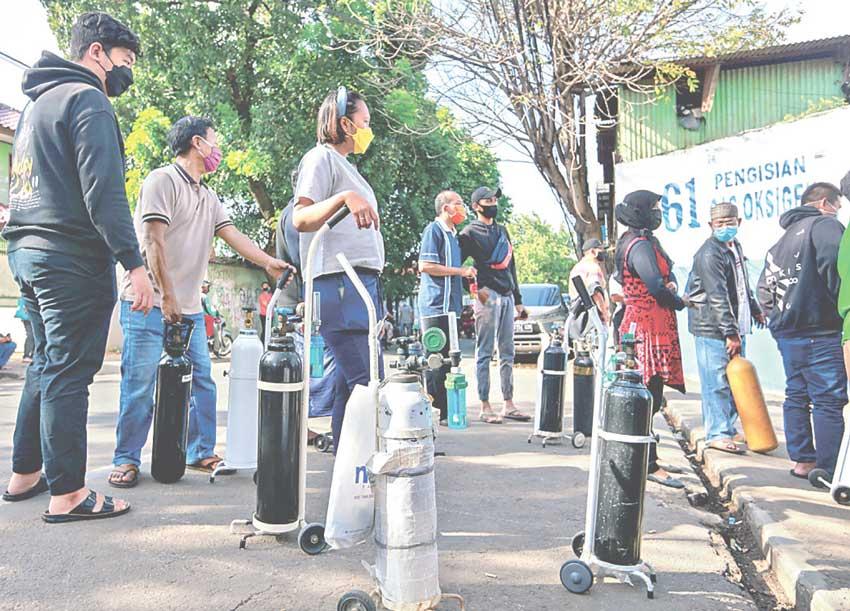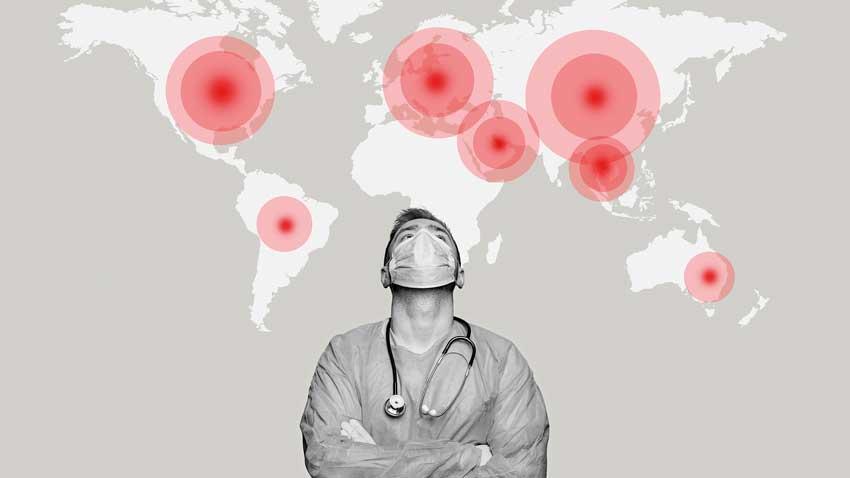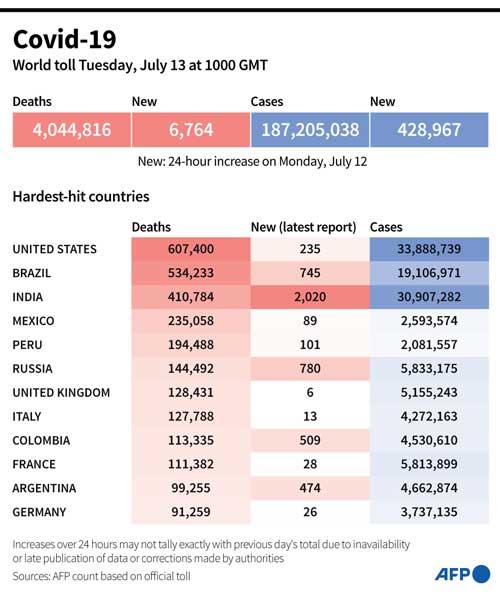15 Jul 2021 - {{hitsCtrl.values.hits}}

The WHO’s Strategic Advisory Group of Experts on vaccines said in June the Pfizer Inc vaccine could be used as a second dose after an initial dose of AstraZeneca, if the latter is not available
Since the outbreak of the disease in China in 2019, health authorities in over 200 countries reported an approximate 187.8 million Covid‑19 cases and 4 million deaths
The World Health Organisation’s chief scientist has advised individuals against mixing and matching COVID-19 vaccines from different manufacturers, saying such decisions should be left to public health authorities
 Only a handful of countries or territories have been left with no active Covid-19 cases, as they managed to keep the deadly global pandemic at bay. From the United States to Italy and India, second or third waves of the illness have worsened conditions than when the pandemic initially hit in early 2020. In Sri Lanka where lock downs and travel restrictions have eased, its citizens are benefiting from an accelerated vaccination roll out by the government.
Only a handful of countries or territories have been left with no active Covid-19 cases, as they managed to keep the deadly global pandemic at bay. From the United States to Italy and India, second or third waves of the illness have worsened conditions than when the pandemic initially hit in early 2020. In Sri Lanka where lock downs and travel restrictions have eased, its citizens are benefiting from an accelerated vaccination roll out by the government.
Since the outbreak of the disease in China in 2019, health authorities in over 200 countries reported an approximate 187.8 million Covid‑19 cases and 4 million deaths. Countries across Asia, Americas and Africa are seeing a resurgence in COVID-19 cases, forcing them to bring back or extend stringent lock downs and hampering drives to vaccinate their population. Here’s a look at the latest global developments of the Coronavirus.
EUROPE
 Spain surpassed 4 million Coronavirus cases since the pandemic began after adding 43,960 new cases. The highly contagious Delta variant is reported to have driven the surge of infections among unvaccinated young people.
Spain surpassed 4 million Coronavirus cases since the pandemic began after adding 43,960 new cases. The highly contagious Delta variant is reported to have driven the surge of infections among unvaccinated young people. 

 German Chancellor Angela Merkel warned more people needed to be vaccinated against COVID-19 before restrictions could be lifted, after reports that England is set to do away with nearly all restrictions from next week.
German Chancellor Angela Merkel warned more people needed to be vaccinated against COVID-19 before restrictions could be lifted, after reports that England is set to do away with nearly all restrictions from next week.  asks are to remain mandatory on London transport. Masks will remain mandatory on London’s public transport network after July 19. The public will be expected, rather than compelled by law, to wear masks in indoor enclosed spaces across the country from next week, as rules decided upon by the Conservative administration are eased.
asks are to remain mandatory on London transport. Masks will remain mandatory on London’s public transport network after July 19. The public will be expected, rather than compelled by law, to wear masks in indoor enclosed spaces across the country from next week, as rules decided upon by the Conservative administration are eased.

ASIA-PACIFIC

 Singapore’s tourism board said a cruise ship operated by Genting Cruise Lines on a so-called cruise to nowhere had returned to the city-state after a 40-year-old passenger was suspected to have contracted COVID-19.
Singapore’s tourism board said a cruise ship operated by Genting Cruise Lines on a so-called cruise to nowhere had returned to the city-state after a 40-year-old passenger was suspected to have contracted COVID-19. 
 Australia extended a lockdown in Sydney by at least 14 days, after three weeks of initial restrictions failed to stamp out the biggest outbreak of COVID-19 this year, in the country’s largest city. The shutdown has now been extended on two occasions and total infections since the first was initially detected in the city’s eastern suburbs in mid-June now stand at just under 900. Two deaths have been reported, the first for the country this year.
Australia extended a lockdown in Sydney by at least 14 days, after three weeks of initial restrictions failed to stamp out the biggest outbreak of COVID-19 this year, in the country’s largest city. The shutdown has now been extended on two occasions and total infections since the first was initially detected in the city’s eastern suburbs in mid-June now stand at just under 900. Two deaths have been reported, the first for the country this year. AMERICAS

 Guatemala declared a “state of prevention” for the entire country, limiting outdoor meetings and public demonstrations, after a dramatic spike in cases last week.
Guatemala declared a “state of prevention” for the entire country, limiting outdoor meetings and public demonstrations, after a dramatic spike in cases last week.MIDDLE EAST AND AFRICA
 Bahrain civil aviation affairs said entry will be banned from 16 new countries including Tunisia, Iran, Iraq, Mexico, Philippines, South Africa and Indonesia over coronavirus concerns, the state news agency reported.
Bahrain civil aviation affairs said entry will be banned from 16 new countries including Tunisia, Iran, Iraq, Mexico, Philippines, South Africa and Indonesia over coronavirus concerns, the state news agency reported.  Tunisia is struggling to contain its worst outbreak ever, with the virus infecting parliament speaker Rached Ghannouchi, while Morocco has planned to send 100 intensive care beds and similar number of ventilators to help tackle the crisis.
Tunisia is struggling to contain its worst outbreak ever, with the virus infecting parliament speaker Rached Ghannouchi, while Morocco has planned to send 100 intensive care beds and similar number of ventilators to help tackle the crisis. 
 Israel changed its strategy under what Prime Minister Naftali Bennett calls a policy of “soft suppression”, the government wants Israelis to learn to live with the virus - involving the fewest possible restrictions and avoiding a fourth national lockdown that could do further harm to the economy.
Israel changed its strategy under what Prime Minister Naftali Bennett calls a policy of “soft suppression”, the government wants Israelis to learn to live with the virus - involving the fewest possible restrictions and avoiding a fourth national lockdown that could do further harm to the economy. ECONOMIC IMPACT
 Japan’s economy will grow at a slower pace than initially expected in the third quarter, as fresh coronavirus emergency curbs in Tokyo, extending through the Olympic Games, weigh on consumption, a Reuters poll found.
Japan’s economy will grow at a slower pace than initially expected in the third quarter, as fresh coronavirus emergency curbs in Tokyo, extending through the Olympic Games, weigh on consumption, a Reuters poll found. MEDICAL DEVELOPMENTS

WHO warns individuals against mixing and matching COVID vaccines
The World Health Organisation’s chief scientist has advised individuals against mixing and matching COVID-19 vaccines from different manufacturers, saying such decisions should be left to public health authorities.
“It’s a little bit of a dangerous trend here,” Soumya Swaminathan told an online briefing on Monday after a question about booster shots. “It will be a chaotic situation in countries if citizens start deciding when and who will be taking a second, a third and a fourth dose.” Swaminathan had called mixing a “data-free zone” but later clarified her remarks in an overnight tweet.
Individuals should not decide for themselves, public health agencies can, based on available data,” she said in the tweet. “Data from mix and match studies of different vaccines are awaited - immunogenicity and safety both need to be evaluated
 “Individuals should not decide for themselves, public health agencies can, based on available data,” she said in the tweet. “Data from mix and match studies of different vaccines are awaited - immunogenicity and safety both need to be evaluated.” The WHO’s Strategic Advisory Group of Experts on vaccines said in June the Pfizer Inc vaccine could be used as a second dose after an initial dose of AstraZeneca, if the latter is not available.
“Individuals should not decide for themselves, public health agencies can, based on available data,” she said in the tweet. “Data from mix and match studies of different vaccines are awaited - immunogenicity and safety both need to be evaluated.” The WHO’s Strategic Advisory Group of Experts on vaccines said in June the Pfizer Inc vaccine could be used as a second dose after an initial dose of AstraZeneca, if the latter is not available.
A clinical trial led by the University of Oxford in the UK is ongoing to investigate mixing the regimen of AstraZeneca and Pfizer vaccines. The trial was recently expanded to include the Moderna Inc and Novovax Inc vaccines.
(Source: Reuters)
26 Nov 2024 3 hours ago
26 Nov 2024 4 hours ago
26 Nov 2024 5 hours ago
26 Nov 2024 6 hours ago
26 Nov 2024 6 hours ago